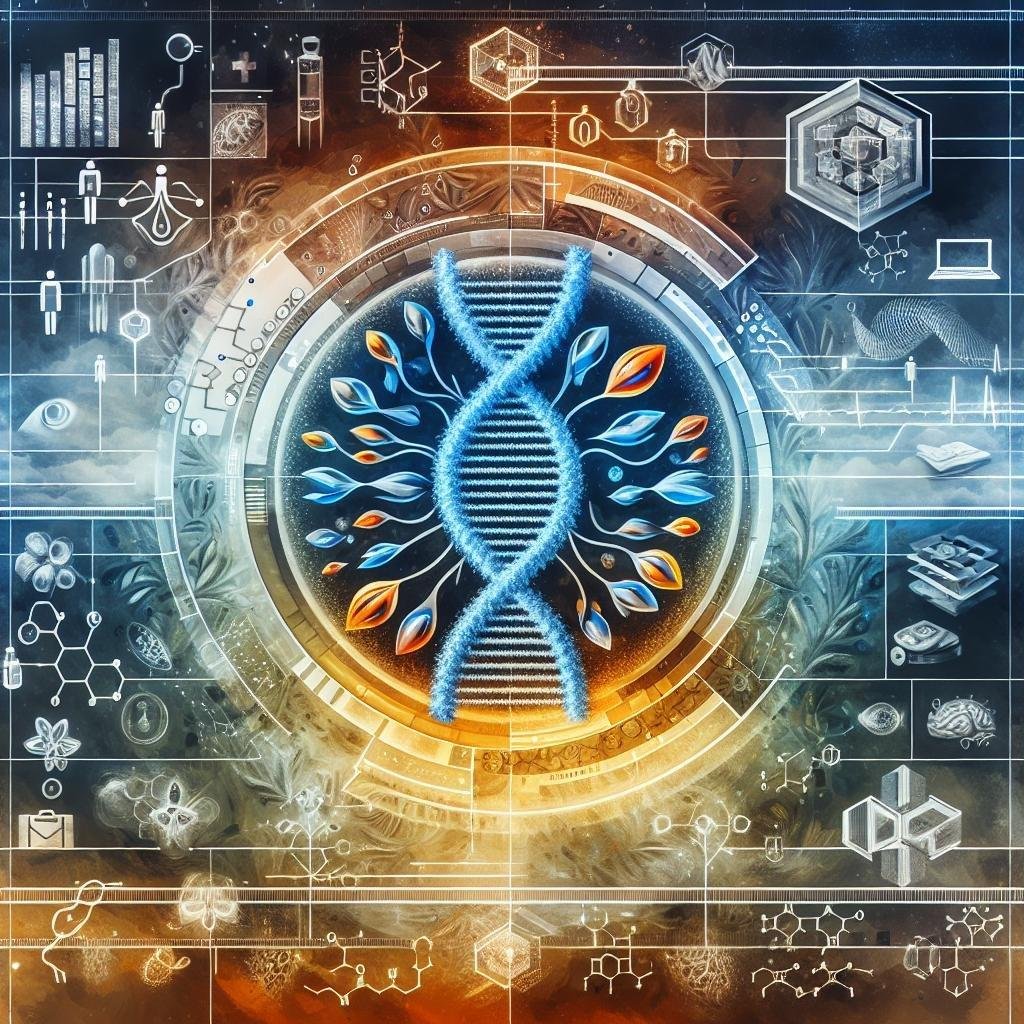In a world that pulsates with technological innovation, the realm of biotechnology stands at the forefront, weaving together the intricate threads of life sciences and cutting-edge advancements. As we forge deeper into an era dominated by synthetic biology, gene editing, and bioinformatics, the promise of biotechnology unravels before us like a complex tapestry, rich with potential yet fraught with ethical dilemmas. The rapid pace of these emerging tech trends raises essential questions: How do we balance the quest for scientific progress with the moral imperatives that govern our society? What responsibilities do we hold towards nature, humanity, and future generations as we harness the power of living systems? This article embarks on a journey to explore the multifaceted landscape of biotechnology ethics, delving into how these principles shape not only our innovations but also our collective conscience in an age where the boundaries of possibility are constantly being redefined. Join us as we navigate this critical intersection of technology and morality, seeking clarity in the complexities that lie ahead.
Exploring the Ethical Landscape of Biotechnology in Innovation
As we venture into the intricate world of biotechnology, a multitude of ethical considerations must be addressed to navigate the uncharted territories of innovation. The rapid advancements in technologies such as gene editing, synthetic biology, and personalized medicine have propelled forward possibilities that were once confined to the realm of fiction. Yet, with such transformative power comes the responsibility to examine its moral implications. Stakeholders from various backgrounds, including scientists, ethicists, and policymakers, must engage in meaningful dialogues to establish a framework that ensures advancements serve the greater good while maintaining respect for life and biodiversity.
To grasp the ethical landscape, we must reflect on key concerns that accompany biotechnological innovation. These include:
- Equity and Access: How do we ensure that the benefits of biotechnological advancements are accessible to all, avoiding a divide between wealthy and marginalized communities?
- Safety and Regulation: In the absence of comprehensive regulatory frameworks, how can we guarantee the safety of new biotechnological products and processes?
- Environmental Impact: What steps should we take to minimize potential harm to ecosystems and biodiversity resulting from biotechnological applications?
In examining these elements, collaborative efforts may lead to a more responsible approach to biotechnology. To illustrate our understanding of the ethical considerations, consider the following table that summarizes different biotechnological advancements against their associated ethical dilemmas:
| Biotechnology Advancement | Associated Ethical Dilemma |
|---|---|
| Gene Editing (CRISPR) | Safety Concerns & Unintended Consequences |
| Synthetic Biology | Playing God vs. Natural Order |
| Biobanking | Privacy and Consent Issues |
| Personalized Medicine | Equity in Healthcare Access |

Balancing Progress and Responsibility: The Role of Stakeholders
In the rapidly evolving landscape of biotechnology, the integration of emerging technologies raises crucial ethical questions that can only be addressed through the concerted efforts of all stakeholders involved. Scientists, policymakers, business leaders, and the public share a collective responsibility to ensure that advancements are not only safe and effective but also equitable and just. Balancing innovation with caution involves considering various perspectives, ensuring that marginalized communities are included in conversations that could affect their lives and environments. The need for a code of ethics that reflects diverse cultural viewpoints is paramount, fostering a more inclusive approach that goes beyond mere compliance with regulations.
To facilitate meaningful dialogue, stakeholders should focus on three core areas: transparency, sustainability, and education. Emphasizing transparency helps build trust, as stakeholders disclose research intentions, potential risks, and regulatory compliance. Sustainability, on the other hand, ensures that technological advancements do not compromise the health of our planet or future generations. investing in education equips individuals with the knowledge needed to engage in informed discussions about biotechnological implications. To illustrate the growing concerns and responsibilities, the table below summarizes key stakeholder roles in advancing ethical biotechnology practices.
| Stakeholder | Key Role |
|---|---|
| Scientists | Conduct research with ethical guidelines. |
| Policymakers | Create regulations that prioritize public safety. |
| Business Leaders | Implement corporate social responsibility initiatives. |
| Public | Engage in discussions and advocate for ethical practices. |

Navigating Regulatory Frameworks for Emerging Biotechnologies
As the landscape of biotechnologies continues to evolve, the regulatory environment must adapt in tandem to ensure safety, efficacy, and ethical standards. Policymakers face the daunting task of creating frameworks that can keep pace with rapid scientific advancements. Successful navigation of these frameworks requires an understanding of several key components:
- Risk Assessment: Evaluating potential hazards to health and the environment.
- Stakeholder Engagement: Involving communities, scientists, and industry leaders in discussions.
- Global Alignment: Harmonizing regulations across borders to facilitate innovation.
Moreover, it is essential to consider the implications of emerging biotechnologies on society. Regulatory frameworks must address concerns surrounding gene editing, synthetic biology, and personalized medicine, ensuring that ethical considerations are woven into the fabric of policy-making. A collaborative approach among scientists, ethicists, and regulators can help illuminate:
| Ethical Considerations | Potential Implications |
|---|---|
| Equity in Access | Ensuring technologies are available to all socio-economic groups. |
| Informed Consent | Guaranteeing individuals understand the risks and benefits. |
| Transparency | Building public trust through clear communication. |

Fostering Public Engagement and Trust in Biotech Developments
The intersection of biotechnology and public trust is a complex landscape that requires deliberate and sustained efforts to build a rapport with communities. Engaging the public in dialogues about advancements in biotechnology can demystify the field and alleviate apprehensions surrounding ethical concerns. Key strategies to foster this engagement include:
- Transparent Communication: Provide clear, accessible information about biotech developments, including potential risks and benefits.
- Community Involvement: Encourage participation in discussions, forums, and workshops where public opinions can be shared and heard.
- Educational Initiatives: Implement programs that educate the public about biotechnology, including its applications, limitations, and regulatory frameworks.
Furthermore, engaging with diverse stakeholder groups ensures that many perspectives are considered in the decision-making process. Regular feedback loops can enhance trust, create accountability, and empower communities in biotechnology-related initiatives. Below is an overview of different stakeholders and their roles in promoting public engagement:
| Stakeholder Group | Role in Engagement |
|---|---|
| Scientists | Sharing research findings and potential impacts. |
| Governments | Establishing regulations and funding public outreach. |
| Nonprofits | Advocating for ethical practices and community interest. |
| Industry stakeholders | Communicating business practices and ethical commitments. |
Q&A
Q&A: Understanding the Ethics of Biotechnology in Emerging Tech Trends
Q1: What is biotechnology, and why is it significant in today’s tech landscape?
A1: Biotechnology refers to the use of living organisms or their systems to develop products and processes that benefit humanity. Its significance in today’s tech landscape stems from its potential to revolutionize medicine, agriculture, and environmental sustainability. As we harness genetic engineering, CRISPR technology, and synthetic biology, biotechnology promises innovative solutions to some of the world’s most pressing challenges, from disease treatment to food security.
Q2: What are some of the ethical concerns surrounding biotechnology?
A2: The ethical concerns surrounding biotechnology are multifaceted and often intersect with societal values. Key issues include genetic privacy, especially in gene editing; the potential for designer babies, which raises questions about eugenics; and environmental impacts of genetically modified organisms (GMOs). Moreover, equitable access to biotechnological advancements poses significant challenges, potentially exacerbating existing inequalities between different populations.
Q3: How does genetic editing, particularly CRISPR, alter the ethics of biotechnology?
A3: CRISPR technology has significantly advanced our capabilities in genetic editing, allowing for precise alterations in DNA. This ability raises profound ethical questions. For example, while it offers tremendous potential for curing genetic diseases, it also opens the door to the controversial practice of enhancing human traits. The distinction between treatment and enhancement complicates the ethical landscape, prompting debates about the moral limits of our intervention in natural evolution.
Q4: In what ways can biotechnology impact food security, and what ethical dilemmas does this present?
A4: Biotechnology can enhance food security by creating crops that resist pests, tolerate climate change, and yield more produce. However, this presents ethical dilemmas such as the long-term effects of GMOs on health and biodiversity, the concentration of power among biotech corporations, and the rights of farmers who may be pressured to adopt proprietary seeds. Balancing innovation with precaution and consumer rights remains a critical ethical challenge.
Q5: How can policymakers address ethical concerns in biotechnology?
A5: Policymakers can address ethical concerns in biotechnology through comprehensive legislation that prioritizes transparency, public engagement, and ethical standards in research and development. Establishing frameworks for ethical reviews and promoting interdisciplinary dialogue involving ethicists, scientists, and community stakeholders can ensure diverse perspectives are considered. Additionally, regulations that ensure equitable access to biotechnological advancements can help mitigate potential inequalities.
Q6: What role does public perception play in shaping the ethics of biotechnology?
A6: Public perception is crucial in shaping the ethical landscape of biotechnology. Misinformation and lack of understanding can lead to fear and resistance against biotechnological innovations. Conversely, informed public discourse can foster acceptance and trust. Engaging communities in discussions about the risks and benefits of biotechnological advances through education campaigns can empower individuals to participate in decision-making processes, ultimately influencing ethical standards in the field.
Q7: Looking ahead, what trends in biotechnology should we watch for, and what ethical considerations accompany them?
A7: Key trends to watch include advancements in gene therapy, personalized medicine, and biopharmaceuticals, each bringing unique ethical concerns. The capability for extensive genomic data collection raises privacy issues, while the rise of bioinformatics necessitates robust data protection measures. As biotechnology continues to advance, ethical considerations must evolve alongside technology, ensuring that human dignity and ecological integrity are maintained.
Q8: How can individuals contribute to the ethical discourse surrounding biotechnology?
A8: Individuals can contribute to the ethical discourse surrounding biotechnology by staying informed, participating in local forums, and advocating for transparency and accountability in the biotech industry. Engaging with policy discussions, supporting ethical research initiatives, and promoting equitable access to biotechnological benefits are practical steps individuals can take to influence how these technologies are developed and implemented.
To Conclude
In the intricate tapestry of innovation, biotechnology emerges as both a beacon of possibility and a battleground for ethical consideration. As we navigate the uncharted waters of emerging tech trends, it becomes increasingly vital to engage in open dialogues about the implications of our scientific advancements. The intersection of biology and technology challenges us not only to innovate but also to reflect on the impact our choices have on society, the environment, and future generations.
Understanding the ethics of biotechnology is not merely a scholarly pursuit; it is a societal necessity. As we harness the potential of genetic engineering, synthetic biology, and AI-driven healthcare solutions, we are tasked with a profound responsibility—ensuring that our quest for progress does not compromise the values we hold dear.
As the landscape of biotechnology continues to evolve, let us remain vigilant stewards of the ethical considerations at play. It is through thoughtful engagement, critical examination, and collaborative dialogue that we can pave the way for a future where technological advancements harmonize with our collective ethical compass. The journey is just beginning, and together, we can shape not only the future of biotechnology but the very fabric of our society.

